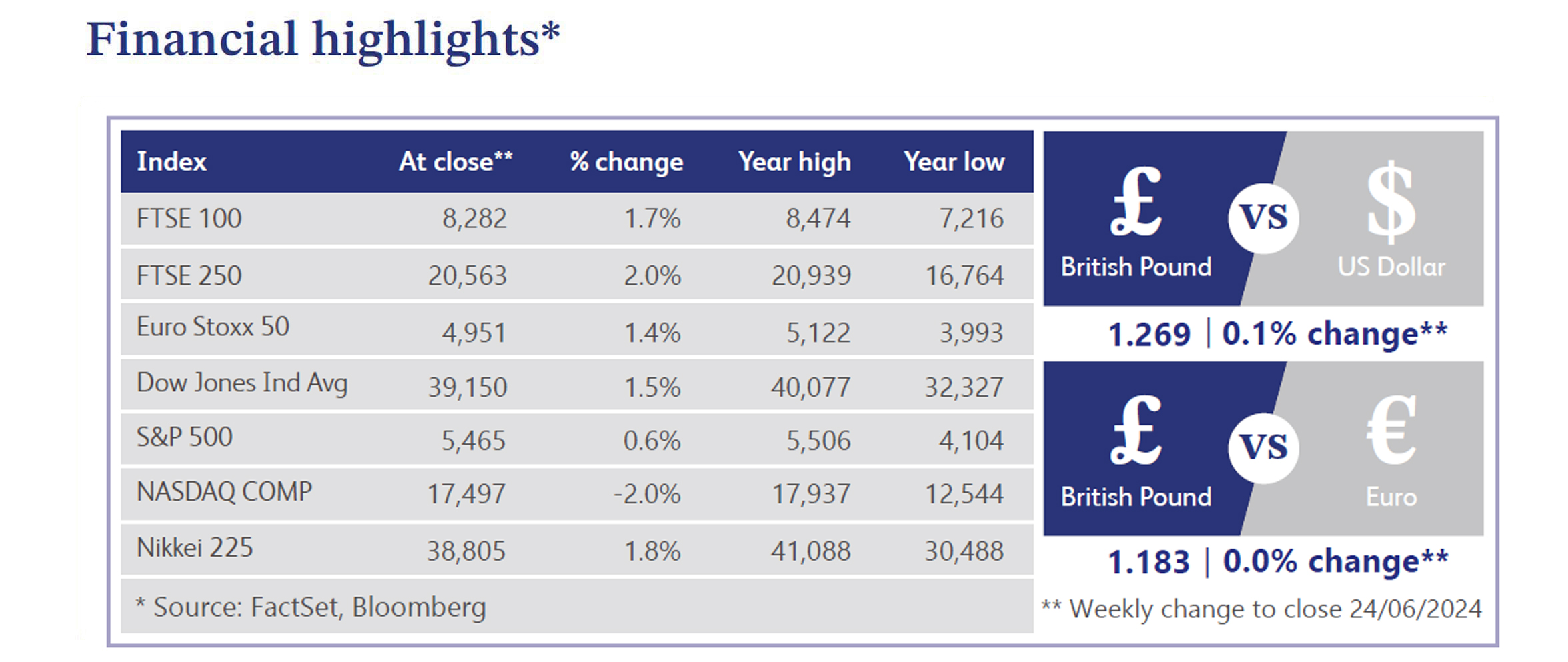
25 June 2024
UK inflation continued to ease in May, with the headline rate at 2.0% year-on-year, down from 2.3% in the 12 months to April, marking the lowest rate since July 2021. Core inflation was 3.5%, while services prices remained high at 5.7%. The largest downward pressure came from food prices, while motor fuels and transport costs drove inflation up. The Bank of England (“BOE”) held interest rates at 5.25%, emphasising the need for restrictive monetary policy to control inflation. Market expectations for an August rate cut increased to more than a 50% chance after the news, up from 30%. By year-end, 0.50% of rate cuts are now priced in. Economists are divided on whether the BOE will reduce rates in August or later, with some expecting a delayed cut followed by faster easing. Tight fiscal policy under a new government could lead to a more rapid easing cycle next year. The biggest risk to early BOE easing is a stronger economy with rising price pressures and wages. The BOE forecasts headline inflation to rise above target from the autumn and will use updated macroeconomic projections at its next meeting.
The rise in UK minimum wages, effective from April, has pressured employers to reduce temporary hiring, particularly in the hotel, restaurant, tourism and construction sectors, according to The Times. Data from the Recruitment and Employment Confederation indicates a sharp decline in job postings for temporary summer positions in April and May compared to the same period last year. Last week's official labour market data revealed an unexpected increase in unemployment, although wage growth was bolstered by the minimum wage hike.
The BOE's quantitative tightening (“QT”) policy came under scrutiny, with Bloomberg reporting that the policy has incurred losses significantly higher than those of the US Federal Reserve (“Fed”) and the European Central Bank (“ECB”). Losses on bonds purchased between 2009 and 2021 are estimated at 4.7 - 4.9% of gross domestic product, compared to 1.3 - 1.5% for the Fed and 3.2 - 3.4% for the ECB. This has led to speculation that QT could end by September. Additionally, the Office for National Statistics reported a 4% year-on-year decline in retail footfall for the week ending 16 June, with 22% of firms noting decreased turnover in May. The UK purchasing managers index (“PMI”) data indicated a slowdown in the services sector, with growth easing to a seven-month low, while manufacturing reached a 26-month high, driven by increased new orders and efforts to expand capacity.
Equities in the US started strong in a shortened trading week, but lost momentum towards the end. Fed rate cut expectations rose following a softer retail sales report, adding to signs of a cooling US economy from inflation data earlier in the month. Artificial intelligence (“AI”) enthusiasm boosted sentiment, with Nvidia surpassing Microsoft to become the most valuable public company, though AI leaders faced selling pressure later in the week due to growth concerns. The major macro event was the retail sales report, which missed expectations partly due to falling gas prices, reflecting cautious consumer spending. Other economic data included in-line jobless claims, weaker housing starts and mixed manufacturing indexes, with the Philadelphia Fed index declining but June flash PMIs showing solid growth and cooling inflation.

Ocado Group, the online grocery technology business, saw its share price decline approximately 12.9% last week after the company provided an update on its Sobeys partnership. Ocado reported that Empire Company Limited has announced a pause to the planned launch of Sobeys in Canada, which was originally scheduled for 2025. It was stated that Ocado and Sobeys have decided to focus their joint resources on driving orders and sales volumes across the current network for now. The company reiterated that its financial guidance remains unchanged for the full year 2024, with the company’s target to be cash flow positive in the mid-term.
Games Workshop, the manufacturer and retailer of miniature war games, announced its latest financial results, which saw the company’s share price close the week approximately 13% higher. The company reported revenue increased to approximately £490 million, compared to last year's figure of £445 million. Profit before tax also increased to approximately £200 million, with the previous year’s figure being £171 million.
Phoenix Group Holdings, the life and pensions consolidator, saw its share price increase by approximately 7.4% last week as the company announced it had completed the initial phase of its deleveraging programme. This programme intends to repay at least £500 million of debt as Phoenix targets a Solvency II leverage ratio of approximately 30% by the end of 2026. This announcement reported that the company has reduced its outstanding debt by £250 million, with its annual debt interest costs broadly unchanged after this exercise. Phoenix also stated that it maintains a strong cash interest cover of approximately 6 times.

Market Commentary prepared by Walker Crips Investment Management Limited.
This publication is intended to be Walker Crips Investment Management’s own commentary on markets. It is not investment research and should not be construed as an offer or solicitation to buy, sell or trade in any of the investments, sectors or asset classes mentioned. The value of any investment and the income arising from it is not guaranteed and can fall as well as rise, so that you may not get back the amount you originally invested. Past performance is not a reliable indicator of future results. Movements in exchange rates can have an adverse effect on the value, price or income of any non-sterling denominated investment. Nothing in this document constitutes advice to undertake a transaction, and if you require professional advice you should contact your financial adviser or your usual contact at Walker Crips. Walker Crips Investment Management Limited is authorised and regulated by the Financial Conduct Authority (FRN:226344) and is a member of the London Stock Exchange. Registered office: Old Change House, 128 Queen Victoria Street, London, EC4V 4BJ. Registered in England and Wales number 4774117.
Important Note
No news or research content is a recommendation to deal. It is important to remember that the value of investments and the income from them can go down as well as up, so you could get back less than you invest. If you have any doubts about the suitability of any investment for your circumstances, you should contact your financial advisor.